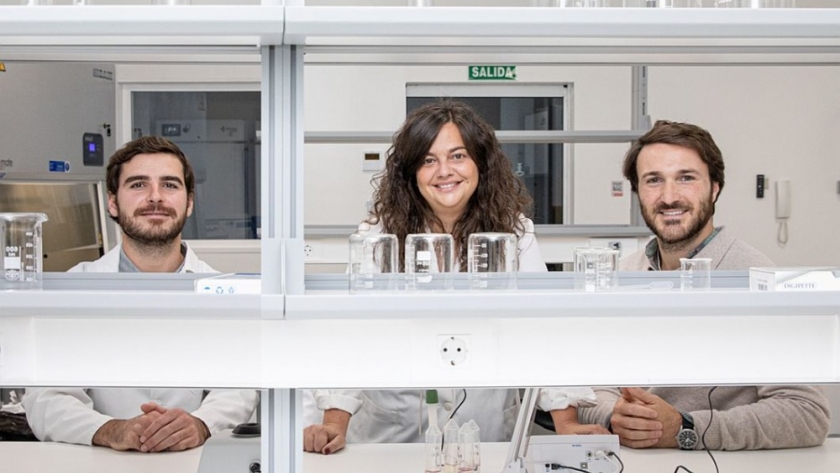
By Agroempresario.com
Spanish biomass fermentation startup MOA Foodtech has successfully secured a €2.3 million ($2.4 million) grant from the European Innovation Council (EIC) accelerator program, along with a €12.5 million ($13 million) commitment in equity funding from the EIC Fund under its blended finance scheme. This funding will play a pivotal role in scaling the company's operations and advancing its innovative fermentation technology aimed at transforming food waste into high-value ingredients.
Founded in late 2020 by Bosco Emparanza, Dr. Susana Sánchez, and José María Elorza, MOA Foodtech specializes in biomass fermentation, utilizing self-GRAS (Generally Recognized as Safe) yeast strains that thrive on a variety of food side streams, such as distillers' grains and crop residues. The company's core mission is to create a B2B sustainable ingredient platform that merges biotechnology and artificial intelligence (AI) to convert agricultural byproducts into functional and nutritious ingredients.
"We’re building a platform where we combine biotechnology and AI to transform waste and byproducts from the agrifood industry into high-value ingredients," says Emparanza. "The food industry produces millions of tons of byproducts annually, and we are looking for new, sustainable solutions to repurpose them."
The company is tapping into a growing market of plant-based food alternatives, working on a range of products from meat substitutes to bakery goods, snacks, soups, and even pet food. With over 300 microbes in its library, the company initially focused on yeast fermentation, which is classified as a "safe" food ingredient for regulatory purposes, particularly in the US market.
MOA Foodtech's unique approach centers on its AI-powered platform called Albatross, which optimizes the fermentation process by balancing feedstocks made from food and agricultural waste. This tool combines data from the company's diverse range of byproducts with microbial metabolism models to improve fermentation efficiency and reduce costs.
"We are looking for the perfect balance between carbon and nitrogen in our feedstocks, but this is no easy task. Each byproduct has different characteristics, and we need real-time adjustments to ensure the best conversion rates," explains Emparanza. "Albatross allows us to improve the fermentation process by adjusting the culture media in real time, helping us scale up faster."
With Albatross, MOA Foodtech has dramatically accelerated its development process. While it previously took around six months to optimize the conditions for fermenting a new ingredient, the AI tool now enables the company to complete the same process in just two weeks. This advancement has greatly reduced the time needed to bring new ingredients to market, enhancing the company's efficiency and growth potential.
One of the main challenges in biomass fermentation is sourcing low-cost feedstocks. MOA Foodtech's approach of using agricultural byproducts rather than traditional sugars like dextrose is revolutionary but also challenging. The company’s solution relies on its AI platform to identify the optimal feedstocks that will yield the highest quality ingredients at the lowest possible cost.
“By using food waste, which is readily available worldwide, we can achieve a low-cost culture medium, which is key to scaling up production. But sustainability alone isn't enough,” Emparanza adds. "Our goal is not just to create sustainable ingredients but to lower costs and provide functional benefits for various food applications."
The company’s first product is a yeast-based ingredient with an impressive nutritional profile: about 50% protein, 35% fiber, and great taste. MOA Foodtech's second product, derived from the same biomass, has been engineered to provide strong gelling and emulsifying properties, making it highly versatile in food processing.
“Both of these ingredients are produced without the need for precision fermentation or GMOs, which means we can achieve specific functionalities without complicated or controversial processes,” Emparanza states.
The new funding will enable MOA Foodtech to scale its fermentation processes to an industrial level, reaching a production capacity of 100,000 liters in Spain. The company is on track to launch its first commercially available product in Q2 of 2025. As part of this expansion, MOA Foodtech is building strategic partnerships with food companies and agricultural byproduct producers to streamline operations and enhance sustainability.
“We are working closely with byproduct producers who generate over 100,000 tons of waste annually. By setting up facilities near these providers, we can create a more efficient and sustainable supply chain,” says Emparanza.
The company is also collaborating with the meat industry and the pet food sector, exploring how its ingredients can enhance the nutritional value and functionality of a wide range of food products. Additionally, the team is working on diversifying its product portfolio by creating new ingredients with specific functional properties to meet the growing demand for plant-based and alternative protein sources.
The EU-backed funding is a major milestone for MOA Foodtech, allowing it to accelerate the development of its innovative fermentation technology and further contribute to the growing trend of sustainability in the food sector. As the world faces increasing pressure to reduce food waste and greenhouse gas emissions, MOA Foodtech’s solution represents a promising step toward a more sustainable and efficient food system.
By harnessing the power of AI, biotechnology, and waste-based feedstocks, MOA Foodtech is positioning itself as a leader in the sustainable ingredients space. With a strong focus on both sustainability and cost-efficiency, the company is well on its way to becoming a key player in the transformation of the food industry.
